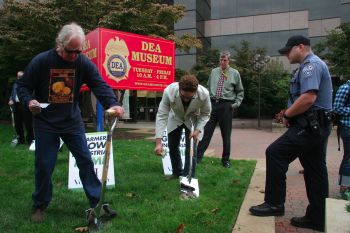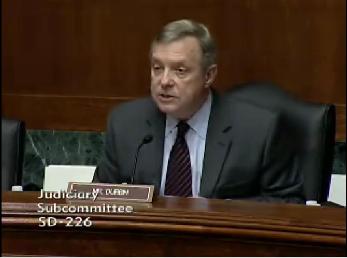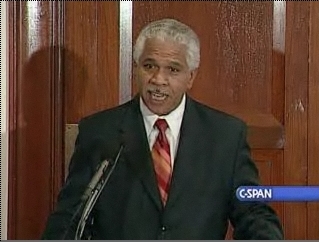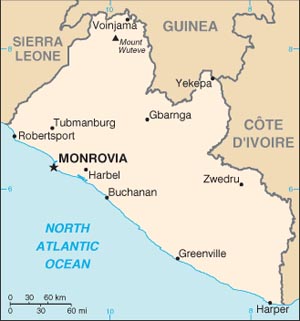The hemp industry is growing weary of waiting for the right to grow hemp in this country. It has filed lawsuits, it has a bill in Congress, and it is asking the Obama administration to treat hemp the same way it treats medical marijuana. But nothing is happening, so now, the movement is turning up the heat with civil disobedience.
Maine is poised to become the next medical marijuana state to adopt a dispensary system with a measure on the ballot in next month's elections. Despite opposition, including from some unexpected quarters, the initiative appears set to pass handily.
Ciudad Juarez continues to earn the title of Mexico's drug war murder capital, but there was plenty of prohibition-fueled killing to go around this past week.
Do you read Drug War Chronicle? If so, we need your feedback to evaluate our work and make the case for Drug War Chronicle to funders. We need donations too.
Is this the year we finally see an end to the infamous crack/powder cocaine sentencing disparity? A bill to do just that has passed the House Judiciary Committee, and now, Sen. Dick Durbin and nine cosponsors have introduced companion legislation in the Senate.
A sheriff shaking down motorists under the guise of asset forfeiture gets a slap on the wrist, and so does a narc who stole the cash from a drug raid. A drug investigation nets two New Jersey cops -- among others -- and another Florida deputy goes down for extorting a pot grower. And sometimes, a cop may not be as corrupt as she first seems.
On Wednesday, a Massachusetts bill that would legalize marijuana got a hearing before the legislature's Joint Revenue Committee. That's a start.
Medical marijuana patients and supporters in Wisconsin have been pushing for action in the legislature this year. Now, a bill is set to be introduced.
The forces of reaction are on the move in Perth. Claiming a mandate from a year-old election, Western Australia Premier Colin Barnett wants to turn back the clock on marijuana law reform, and he's got some more ugly surprises in store, too.
Faced with high levels of methamphetamine use, the New Zealand government is moving to require prescriptions for cold and flu medications containing pseudoephedrine, and just in time for the swine flu. It's got some other anti-meth measures coming, too.
West Africa has become an important transshipment point for cocaine headed from South America to Europe. They also grow a lot of marijuana there. Now, the Liberian government wants to crack down, and it's reading from the old US drug war playbook.
Events and quotes of note from this week's drug policy events of years past.
Every two years drug policy reformers from across the United States and around the world come to the International Drug Policy Reform Conference to listen, learn, network and strategize together for change. This year the conference is in Albuquerque, in November, and StoptheDrugWar.org is a partner.
Apply for an internship at DRCNet and you could spend a semester fighting the good fight!
"Why Does PayPal Have a Problem With Medical Marijuana?," "Awesome: Protesters Plant Hemp at DEA Headquarters, Get Arrested," "What's the Actual Value of a Marijuana Plant?" "Where NOT to Hide Your Stash," "Oakland Cannabis Tax on Lehrer News Hour Last Night," "Senators Sponsor Bill to Lower Crack Cocaine Penalties," "Busy Night on the Medical Marijuana Front."
Fresh from the Hemp Industries Association (HIA) annual convention last weekend in Washington, DC, a pair of real life farmers who want to be hemp farmers joined with hemp industry figures and spokesmen to travel across the Potomac River to DEA headquarters in Arlington, Virginia, where, in an act of civil disobedience, they took shovels to the lawn and planted hemp seeds. Within a few minutes, they were arrested and charged with trespassing.
Hoping to focus the attention of the Obama administration on halting DEA interference, North Dakota farmer Wayne Hauge, Vermont farmer Will Allen, HIA President Steve Levine, hemp-based soap producer and Vote Hemp director David Bronner, Vote Hemp communications director Adam Eidinger, and hemp clothing company owner Isaac Nichelson were arrested in the action as another dozen or so supporters and puzzled DEA employees looked on.
"Who has a permit?" demanded a DEA security official. "A permit -- that's what we want from the DEA," Bronner responded.
After being held a few hours, the Hemp Six were released late Tuesday afternoon. On Wednesday, two pleaded guilty to trespassing and were fined $240. The others are expecting to face similar treatment.
Although products made with hemp -- everything from foods to fabrics to paper to auto body panels -- are legal in the US, under the DEA's strained interpretation of the Controlled Substances Act, hemp is considered indistinguishable from marijuana and cannot be planted in the US. According to the hemp industry, it is currently importing about $360 million worth of hemp products each year from countries where hemp production is legal, including Canada, China, and several European nations.
The DEA refused to comment on the action or the issue, referring queries instead to the Department of Justice, which also refused to comment beside pointing reporters to its filings in the ongoing hemp lawsuit.
Currently, eight states -- Hawaii, Kentucky, Maine, Maryland, Montana, North Dakota, Vermont, and West Virginia -- have programs allowing for industrial hemp research or production, but their implementation has been blocked by DEA bureaucratic intransigence. This spring, however, President Obama instructed federal agencies to respect state laws in a presidential directive on federal preemption:
"Executive departments and agencies should be mindful that in our federal system, the citizens of the several States have distinctive circumstances and values, and that in many instances it is appropriate for them to apply to themselves rules and principles that reflect these circumstances and values," said Obama. "As Justice Brandeis explained more than 70 years ago, 'it is one of the happy incidents of the federal system that a single courageous state may, if its citizens choose, serve as a laboratory and try novel social and economic experiments without risk to the rest of the country.'"

police move in (courtesy votehemp.com)
The hemp industry and hemp supporters see several paths forward. Farmer Hauge is a plaintiff in a lawsuit challengingly the DEA's interpretation of the Controlled Substances Act. That case is now before the 8th US Circuit Court of Appeals in St. Louis. US Reps. Ron Paul (R-TX) and Barney Frank (D-MA) are sponsoring a bill that would allow farmers to plant hemp in states where it is permitted, and the industry is urging President Obama and the Justice Department to follow their own example on medical marijuana and leave hemp farmers alone as long as they are legal under state law.
But despite all their efforts, nothing is happening. Tuesday's civil disobedience was designed to begin breaking up the logjam.
"We're getting frustrated," said Bronner, president of Dr. Bronner's Magic Soaps, which has been used hemp oil in its soaps since 1999. "This is supposed to be change with Obama, and things aren't changing. We just had the DEA and local DA go nuts on the dispensaries in San Diego where I live. We spent money on a lobbying firm to get a statement from the Justice Department along the lines of Holder's statement on medical marijuana, but nothing is happening. This would be easy to do, but it's not happening. We understand that Obama has a lot going on, but we're getting increasingly disappointed and frustrated. We hope this will help catalyze something in this administration."
"We're like the fired-up hempsters, we're keeping Jack Herer's ideas alive," said Eidinger, still fired up a day after his arrest Tuesday. "We're beginning a new chapter of hemp activism, and there needs to be a lot more of this stuff. Civil disobedience has to be part of a comprehensive campaign in the courts, in Congress, and out on the streets, in front of DEA offices all over the country."
"We've passed a law in Vermont that you can grow industrial hemp," said Allen, the white-haired, pony-tailed proprietor of the certified organic Cedar Circle Farm. "The only barrier now is the DEA, so we're trying to convince them to back off on this like they backed off on enforcing the medical marijuana law in California. Here, we have a crop that isn't going to get anybody high. We grow organic sunflower and canola, and we'd like to have another oil crop in rotation at our location. It just makes economic sense, and it's a states' rights thing. The DEA shouldn't be involved in this; this isn't a drug."
"We want to get some attention for the cause and show the distinction between industrial hemp and marijuana," said North Dakota farmer Hauge, who is licensed by the state to grow hemp and who is a plaintiff in the lawsuit against the DEA now before the 8th US Circuit Court of Appeals. "It's not a drug; it's just another crop that can be grown in rotation. If it wasn't for the DEA, I would be harvesting my crop right now."
Getting himself arrested for hemp activism in Washington, DC, was a totally new experience for Hauge, who is usually hunkered down on a few hundred acres of North Dakota prairie just south of the Canadian border and just east of the Montana state line. "It was definitely a first for me," said Hauge. "I've never even been stopped for anything."
"We need industrial hemp here in the US, we need to bring jobs to this country," said Nichelson, founder, owner, and CEO of Livity Outernational, a California-based fashion and accessory company that mixes art and activism. "I'm sick of making all our stuff in China cause that's the only place I can get the raw materials. We sent the message that there is a clear distinction between marijuana and industrial hemp," Nicholson said. "We need the support of our president and our law enforcement branches. They need to understand that the US is missing out on a giant opportunity. The myth that hemp causes any problems in society has been completely dispelled."
Even DEA underlings -- if not their higher ups -- get it, said Nicholson, recounting his exchange with one agency employee on Monday. "One DEA official came out and said, 'What's the connection between weed and hemp?' and we said, 'Exactly.'"
The action brought some much-needed media attention to the issue, said Eidinger. "We got a really good article in the Washington Post, the Washington Times wrote about it, too, CNN used our video, NPR talked about the action, the Associated Press picked it up, we had a number of TV stations do reports, so we definitely reached a national audience," he recounted. "And North Dakota media has covered this closely; I've been on the phone with all the media in Bismarck."
It wasn't just civil disobedience in front of the cameras. After the HIA convention ended, hempsters headed for Capitol Hill, where dozens of people attended over 20 scheduled meetings with representatives of their staffs to lobby for the Frank-Paul hemp bill. Some unannounced, unscheduled meetings also took place, Eidinger said.
If the hemp movement indeed adopts further civil disobedience actions, it will have added another prong to its multi-prong strategy of pressing for the end of the prohibition on industrial hemp planting in the US. It might be time for other segments of the drug reform movement to start thinking about civil disobedience, too.
back to top
In a little more than two weeks, Maine residents will go to the polls to vote on a measure that would build on the state's decade-old existing medical marijuana law by creating a system of dispensaries. Despite some grumbling from the usual suspects and announced opposition from some not-so-usual suspects, proponents of the measure say they are confident it will win easily on November 3.

Maine coast
Sponsored by
Maine Citizens for Patient Rights and the
Maine Medical Marijuana Policy Initiative, and funded primarily by the
Drug Policy Alliance, the
Maine Medical Marijuana Act would:
- Establish a system of nonprofit dispensaries which would be overseen and tightly regulated by the state;
- Establish a voluntary identification card for medical marijuana patients and caregivers;
- Protect patients and caregivers from arrest, search and seizure unless there is suspicion of abuse;
- Create new protections for qualified patients and providers in housing, education, employment and child custody;
- Allow patients with Lou Gehrig's disease and Alzheimer's disease access to medical marijuana;
- Require the Department of Health and Human Services to develop a procedure for expanding the list of conditions for which marijuana can be used; and
- Keeps current allowable marijuana quantities at 2.5 ounces and six plants.
When voters go to the polls on November 3 to vote on Question 5, the Medical Marijuana Act, this is the question they will be asked: "Do you want to change the medical marijuana laws to allow treatment of more medical conditions and to create a regulated system of distribution?"
"We feel the campaign is in really good shape right now," said Jonathan Leavitt, who is leading the charge for the initiative.
The existing law needs reform to make it workable, Leavitt said. "In the 10 years since the medical marijuana law went into effect, it has barely been utilized because patients have not had a legal means of obtaining their medicine except to grow their own, and that's just not workable for a seriously ill patient," he said. "With this measure, qualified patients will have full access to their medicine through the establishment of not-for-profit medical marijuana dispensaries."
The measure's language protecting patients from discrimination in housing, employment, and child custody issues is necessary because patients have suffered in the past, Leavitt said. "This will provide a security blanket for qualified patients by really putting in black and white the full legal protections they need."
The child custody provision says that medical marijuana patients cannot be denied visitation or custody of a minor child unless their behavior is "unreasonably dangerous to the minor." That provision drew criticism from the Maine Prosecutors Association, which announced last month it is opposing the measure, but is not putting money into doing so.
"This law reeks of paranoia that the entire criminal justice system is not to be trusted," said association president Evert Fowle, without a hint of irony. Medical marijuana patients across the country, including Maine, have seen their children seized or have lost custody battles solely because of their medical marijuana use or production.
Physicians in Maine can be found on both sides of the question. Dr. John Woytowicz, a family physician in Augusta, told the Maine Public Broadcasting Network, "I don't start with medical marijuana as the first choice for a medical condition. It's part of a whole assessment of what can be done for a given condition. And I put it very frankly to the patient that I would like to explore all opportunities and this could be one of the options as well. My experience is for the appropriate patient, it can be a good option for them, and most people have been benefitted by it with the minimal amount of side effects." Mark Publicker, an addiction specialist with Mercy Recovery Center in Westbrook, told MPBN, "I would advocate for limiting access to marijuana and not to regard it as a medication."
The measure has drawn fire from one unexpected direction: the Maine Vocals, a group of longtime marijuana and medical marijuana legalization activists. The Vocals and its offshoot, Maine Citizens for Medical Marijuana, have announced they oppose the initiative.
"I favor what we have now and working to make it better," said Maine Vocals founder Don Christen. "But this isn't the way. They're just instilling the government into this program, and the government doesn't want it to work," he said.
"The initiative puts DHS in charge of the distribution centers and the overall medical marijuana law, and we're not happy about that because that's the department that has been taking people's children away," said Christen. "DHS is like law enforcement when it comes to medical marijuana. We would like instead to see it in a different department's hands, and with a board of patients and doctors instead of politicians."
"When it came to administering the dispensaries, it was either law enforcement or the Department of Human Services," Leavitt replied. "We thought DHS would be a better fit for questions around the medicinal use of marijuana. DHS also has a mandate to deal with child custody issues, so we included the child custody language because we want it crystal clear that patients will be protected, including around these issues."
Christen also took issue with the $5,000 fee required of dispensary operators. "That's a bit ridiculous," he snorted. "The cost will be prohibitive for a lot of people."
Leavitt responded that such fees had worked in other states and that they were necessary to ensure the measure did not impose a burden on taxpayers.
Christen also objected to the patient ID card system on both philosophical and practical grounds. "After 9/11, Maine opted out of the federal Real ID program," he said. "We don't believe in making lists of everybody up here. And the ID card system gives rights and privileges to those with cards that other patients don't have."
About that, Christen is correct, but only to a point. To enjoy the full protections of the measure, patients, caregivers, and dispensary operators must register with the state and obtain an ID card. Qualifying patients who do not obtain an ID card could still be subject to arrest, but could present their status as medical marijuana patients as an affirmative defense to prosecution and move to have the charges dismissed. But those same patients can be arrested today.
Christen also complained that the measure would bar people who have marijuana felonies from acting as caregivers or dispensary operators or employees. "Those who have marijuana felonies, including myself, will be taken out of the picture," he said, noting that he himself had only gotten out of jail on a marijuana charge 10 days ago.
"We say they haven't read the bill," Leavitt responded. "They talk about how they are fearful they will be knocked out of the loop because they are marijuana felons, but marijuana felons would not be considered felons under this measure."
Actually, the language is a bit ambiguous. It says that someone convicted of a "felony drug offense" cannot be affiliated with a dispensary, but also says that doesn't apply if the felony is more than 10 years old or if it was "an offense that consisted of conduct that would have been permitted under this chapter." Whether Christen would qualify might depend on whether the medical marijuana growing he was convicted for was found to be consistent with the new law's cultivation provisions, and perhaps with yet-to-be-written regulations.
Leavitt wasn't pleased with the not-so-friendly fire. "The Maine Vocals just haven't done the work to get something on the ballot, let alone passed," Leavitt said. "They're doing a great disservice to patients by speaking out against us."
But even with the criticism from the Vocals, it appears that Maine will be the next medical marijuana state to adopt the dispensary system.
back to top
by Bernd Debussman Jr.
Mexican drug trafficking organizations make billions each year trafficking illegal drugs into the United States, profiting enormously from the prohibitionist drug policies of the US government. Since Mexican president Felipe Calderon took office in December 2006 and called the armed forces into the fight against the so-called cartels, prohibition-related violence has killed over 12,000 people, with a death toll of over 5,800 so far in 2009. The increasing militarization of the drug war and the arrest of several high-profile drug traffickers have failed to stem the flow of drugs -- or the violence -- whatsoever. The Merida initiative, which provides $1.4 billion over three years for the US to assist the Mexican government with training, equipment and intelligence, has so far failed to make a difference. Here are a few of the latest developments in Mexico's drug war:
Wednesday, October 7
Three men were killed in the state of Guerrero in different parts of the city of Tecpan de Galeana. Police believe that armed men travelling in two vehicles were involved in all three incidents, which occurred the same night.
Thursday, October 8
A pregnant Guatemalan woman was killed along with her mother in Chiapas. The two Guatemalan women were found dead on a farm outside the city of Tuxla Chico. Additionally, five people were killed in Guerrero, three in Durango, and three decapitated bodies were found in Sinaloa. In the northern city of Monterrey, two people were killed and a third was wounded after a firefight took place inside a restaurant. Fifteen people were reported killed in Ciudad Juarez during the same 24 hour period.
Friday, October 9
In Tijuana, the mutilated body of a state official was found hanging from a bridge. The official, Rogelio Sanchez, was kidnapped Wednesday, and was suspected by police of giving fake drivers licenses to drug traffickers. Tijuana is currently the scene of a violent turf war between the Arellano-Felix Cartel and a breakaway faction led by Teodoro Garcia Simental.
In Guerrero, ten people were found executed, all bearing signs that read "This is what is going to happen to thieves and extortionists. Respectfully, the Boss of Bosses." Local authorities offered no explanation for the notes. (The same appellation was used in a September 12 killing in Acapulco.) Authorities were alerted to the bodies -- many of whose heads were found bound in masking tape -- by a series of anonymous phone calls. In recent months many low-level criminals have been killed by vigilante groups thought to be working with the support of drug traffickers or members of the police.
In the state of Jalisco, four suspected cartel gunmen were killed in an hours-long gun battle with the Mexican army. During the battle, a police helicopter which had been called to the scene was struck by gunfire. A helicopter gunship was also called in. In the state of Chihuahua, a soldier was killed and several wounded after being ambushed near the small hamlet of Colonia LeBaron. The area has been heavily patrolled following the July killing of an anti-crime activist and his neighbor.
Monday, October 12
In the waters of the port city of Mazatlan, four men were arrested after the ship in which they were travelling was found to be carrying approximately 500 kilos of cocaine. After catching sight of an American naval vessel in the area, the men were seen began throwing the drugs overboard, set fire to their ship, and jumped into the water. American naval personnel rescued the men and turned them over to Mexican military authorities.
Tuesday, October 13
In Ciudad Juarez, eight people were killed in drug-related violence. Among them was a woman who was found beheaded. The woman was in her late twenties and had a tattoo of Santa Muerte, or "Saint Death", a symbol popular among Mexican criminals. In a separate incident, four men were killed when gunmen attacked a mechanics workshop, and three others were killed in other shootings.
In Navolato, Sinaloa, a group of armed men kidnapped and killed the brother-in-law of a brother of Vicente Carillo Fuentes, the reputed head of the Juarez Cartel. The man, Jacobo Retamoza, 34, was the lawyer who represented the La Guajira farm, where in November 2008 a group of armed men dressed in military uniforms kidnapped 27 people. He was driving on a highway when he was intercepted by a group of heavily armed gunmen who spirited him away in a truck. Several hours later he was found dead with multiple gunshot wounds.
In Chiapas, a vast arsenal was discovered after the arrest of four men, who ranged in ages from 21 to 41. The men had in their possession 21 AR-15 rifles, 18 AK-47's, and five pistols, one of which was jewel encrusted. Additionally, law enforcement officers found 17, 212 rounds of ammunition, over 300 grenades, several blocks of TNT, a sniper rifle, nine vehicles, and confiscated two race horses found on the property.
Total body count for the week: 178
Total body count for the year: 5,815
Read the last Mexico Drug War Update here.
back to top
Do you read Drug War Chronicle? If so, we'd like to hear from you. DRCNet needs two things:
- We are in between newsletter grants, and that makes our need for donations more pressing. Drug War Chronicle is free to read but not to produce! Click here to make a donation by credit card or PayPal, or to print out a form to send in by mail.
- Please send quotes and reports on how you put our flow of information to work, for use in upcoming grant proposals and letters to funders or potential funders. Do you use DRCNet as a source for public speaking? For letters to the editor? Helping you talk to friends or associates about the issue? Research? For your own edification? Have you changed your mind about any aspects of drug policy since subscribing, or inspired you to get involved in the cause? Do you reprint or repost portions of our bulletins on other lists or in other newsletters? Do you have any criticisms or complaints, or suggestions? We want to hear those too. Please send your response -- one or two sentences would be fine; more is great, too -- email [email protected] or reply to a Chronicle email or use our online comment form. Please let us know if we may reprint your comments, and if so, if we may include your name or if you wish to remain anonymous. IMPORTANT: Even if you have given us this kind of feedback before, we could use your updated feedback now too -- we need to hear from you!
Again, please help us keep Drug War Chronicle alive at this important time! Click here to make a donation online, or send your check or money order to: DRCNet, P.O. Box 18402, Washington, DC 20036. Make your check payable to DRCNet Foundation to make a tax-deductible donation for Drug War Chronicle -- remember if you select one of our member premium gifts that will reduce the portion of your donation that is tax-deductible -- or make a non-deductible donation for our lobbying work -- online or check payable to Drug Reform Coordination Network, same address. We can also accept contributions of stock -- email [email protected] for the necessary info.
back to top
Sen. Richard Durbin (D-IL) Thursday introduced the Fair Sentencing Act of 2009, which would eliminate the 100:1 sentencing disparity in federal crack and powder cocaine cases. Under current laws, in place since the crack hysteria of the mid-1980s, it takes 500 grams of powder cocaine to earn a mandatory minimum five-year prison sentence, but only five grams of crack to earn the same sentence.

Sen. Durbin at May hearing on crack sentencing
The Fair Sentencing Act would eliminate that disparity. Companion legislation has already passed the House Judiciary Committee. Ending the disparity is also supported by President Obama.
Pressure to remedy the injustice of the sentencing disparity has been building for years. The US Sentencing Commission has reduced sentences for crack offenses and has argued for years that the disparity needs to be eliminated. It has been joined by a growing coalition of faith-based, drug reform, criminal justice, and other interest groups. Now, finally, something is moving in Congress.
"Drug use is a serious problem in America and we need tough legislation to combat it," Durbin said in a statement Thursday taking a very mainstream line. "But in addition to being tough, our drug laws must be smart and fair. Our current cocaine laws are not," the statement continued. "The sentencing disparity between crack and powder cocaine has contributed to the imprisonment of African Americans at six times the rate of whites and to the United States' position as the world's leader in incarcerations. Congress has talked about addressing this injustice for long enough; it's time for us to act."
"Sen. Durbin's bill will not only restore judicial discretion, which has been undermined by the statutory mandatory minimum sentences that Congress enacted 23 years ago, but will directly address racial disparities in our criminal justice system and ensure that there is, in fact, 'justice for all'," said Jasmine L. Tyler, deputy director of national affairs for the Drug Policy Alliance. "The House and Senate should move quickly on this issue, 23 years is too long to wait for justice to be served."

NAACP's Hilary Shelton addresses ''Crack the Disparity'' coalition Congressional Briefing Tuesday
The act is cosponsored by Senate Judiciary Committee Chair Patrick Leahy (D-VT) and six other Judiciary Committee members: Sens. Arlen Specter (D-PA), Russell Feingold (D-VT), Ben Cardin (D-MD), Sheldon Whitehouse (D-RI), Edward Kaufman (D-DE), and Al Franken (D-NM). Also cosponsoring the bill are Sens. John Kerry (D-MA) and Chris Dodd (D-CT). Some Republican senators have expressed support for reforming the sentencing disparity, but none have yet signed on as cosponsors.
"Today, the criminal justice system has unfair and biased cocaine penalties that undermine the Constitution's promise of equal treatment for all Americans," Leahy said. "To have faith in our system Americans must have confidence that the laws of this country, including our drug laws, are fair and administered fairly. I believe the Fair Sentencing Act will move us one step closer to reaching that goal. I commend Senator Durbin for his leadership in fixing this decades-old injustice. We should do what we can to restore public confidence in our criminal justice system. Correcting biases in our criminal sentencing laws is a step in that direction."
Click here for C-Span footage of a Tuesday Congressional briefing held by the Crack the Disparity coalition.
back to top
A sheriff shaking down motorists under the guise of asset forfeiture gets a slap on the wrist, and so does a narc who stole the cash from a drug raid. A drug investigation nets two New Jersey cops -- among others -- and another Florida deputy goes down for extorting a pot grower. And sometimes, a cop may not be as corrupt as she first seems. Let's get to it:

cash in the evidence room -- who's counting?
In Rochester, Minnesota,
two of five charges against a Rochester police officer charged with drug corruption were dismissed on October 8. Officer Vanessa Mason was accused in April of tipping off drug dealers and taking money to deliver drugs, and was put on administrative leave then. The two charges were dismissed after a jailed Rochester man said he lied when he told investigators he helped Mason transport drugs last year -- he said he felt pressured by investigators. She still faces one felony count of warning a subject of a surveillance operation and two misdemeanor counts of misconduct by a police officer.
In Jersey City, New Jersey, a Hoboken police officer and a Jersey City police officer were among 17 arrested over the past month in a year-and-a-half long joint operation by the DEA and Jersey City police against a local cocaine trafficking organization. Jersey City Police Officer Mark Medal, 52, who was already suspended for problems with a drug test, was charged with conspiracy to possess cocaine, as was a ranking Hoboken Fire Department official, Battalion Chief Henry Setkiewicz, 59. Both were described as regular customers of the network, although it is not clear if it was for personal use or to resell. Hoboken Police Officer Ralph Gallo, 25, was charged with computer theft -- criminal computer activity -- and official misconduct for allegedly checking a license plate against a law enforcement database for one of the network members. A Hoboken Parking Utility employee, Monica Thorpe, 42, faces similar charges for doing the same thing.
In Miami, another Broward County sheriff's deputy was arrested last Friday in a drug extortion scheme against a marijuana grower that saw Deputy Manuel Silva arrested Oct 2. This week, it was Deputy Fausto "TJ" Tejero's turn. He is accused of acting as Silva's accomplice in offering to ignore the grow in return for cash payments. Tejero was at the scene with Silva when Silva searched the grower's home, found the pot, and offered silence for cash. He is charged with extortion, attempted bribery, burglary and unlawful compensation and is being held without bail.
In St. Louis, a former St. Louis police detective was sentenced last Friday to one year and one day in prison for stealing money seized during a June 2008 drug raid along with two other officers. Vincent Carr, 47, also has to pay back $28,000. He pleaded guilty in February to conspiracy, wire fraud, making false statements, and obstruction of justice. The two other police detectives involved in the theft have also pleaded guilty. Leo Listen was sentenced in September; Bobby Lee Garrett will be sentenced next month.
In Muskogee, Oklahoma, the former McIntosh County sheriff and undersheriff were sentenced September 23 to 27 months in federal prison for stealing money from motorists under the guise of asset forfeiture and keeping it for themselves. Former Sheriff Terry Jones, 36, and Undersheriff Mykol Brookshire, 38, pleaded guilty to "conspiracy under color of law to interfere with interstate commerce" for repeatedly seizing money from drivers under threat of arrest and then keeping either all or part of it for themselves. They went down in May of this year when the driver they pulled over and shook down turned out to be a federal agent in a sting directed at them. They found six bundles of cash, but when they called in the "bust," they only reported five.
back to top
A long line of Massachusetts residents lined up for an opportunity to tell their legislators to free the weed as a marijuana legalization bill got its first hearing before the legislature's Joint Revenue Committee Wednesday. The bill, H 2929, the brainchild of Northampton attorney Richard Evans, a former board member of StoptheDrugWar.org and NORML, was filed at Evans' request by Rep. Ellen Story (D-Amherst).
"Whether you like it or you hate it... it is undeniable in 2009 that marijuana has become inextricably embedded in our culture," Evans told the committee. "It is ubiquitous and it is ineradicable. Members should put on your green eye shades and give close scrutiny to marijuana prohibition," he added, saying that the state could reap revenues from legal marijuana comparable to those gained by introducing casinos.
The bill would remove marijuana offenses from the criminal code and allow for the licensed production and sale of marijuana. Licenses would cost $2,000 a year. It would also impose excise taxes on marijuana retails sales of up to $250 for the highest THC-level weed. Less potent pot would be taxed at a lower rate.
While lawmakers on the committee said little in either support of or opposition to the bill, committee co-chair Rep. Jay Kaufman (D-Lexington) said he was struck by one particular facet of the arguments in favor of legalization. "This is probably the only hearing this committee has ever had or will ever have with this number of people asking to be taxed," he said.
The move to legalize comes less than a year after Massachusetts voters overwhelmingly approved an initiative to decriminalize the possession of up to an ounce. But proponents of the bill argued that decriminalization doesn't go far enough and that it doesn't provide a place for users to legally obtain marijuana.
That measure was opposed by most of the state's political establishment, including Mayor Thomas Menino (D), the state's district attorneys, and by Gov. Deval Patrick (D), who in his '06 campaign said he was very comfortable with the idea of legalizing marijuana, but would veto a decrim bill because he doesn't consider it a priority. But leaders expressed their commitment to implement the measure after it passed.
The current bill is unlikely to go anywhere this year, but now it has at least had a hearing. That's a start.
back to top
Wisconsin legislators will get another crack at passing a medical marijuana bill. State Rep. Mark Pocan (D-Madison) and Sen. Jon Erpenbach (D-Waunakee) announced October 8 they were sponsoring LRB 2517, the Jacki Rickert Medical Marijuana Act, named after the long-time Mondovi patient and activist. They are currently looking for cosponsors.

IMMLY march last week, Madison
Rickert famously led a 210-mile march in her wheelchair to the state house in 1997 seeking to bring attention to her cause. Since then, she and the group
Is My Medicine Legal Yet (IMMLY) have worked tirelessly to get a medical marijuana bill passed in the Cheesehead State. A 2007 bill died in committee. This year, IMMLY communications director Gary Storck and terminally ill disabled veteran Mary Powers have been leading weekly delegations of patients to the capitol to meet with and educate lawmakers.
Under the proposed legislation, terminally or seriously ill patients could obtain a doctor's recommendation to use marijuana. Possession of either the recommendation or a state ID issued by the Department of Human Services would protect patients and caregivers from arrest and prosecution. Patients and caregivers could grow up to 12 plants and possess up to three ounces of marijuana. The bill also provides for a dispensary system similar to the state-regulated one recently set up in Rhode Island.
"It's a situation that makes a lot of sense and it's also a situation dealing with compassion -- how can you not have compassion for someone who says, 'look the nausea is really upsetting, the chemo treatments are really tough and this is the only way I can find a little bit of relief from the pain,'" said Erpenbach at a press conference announcing the bill.
The legislators' action came a week after IMMLY led a demonstration of hundreds of patients and supporters at the state capitol in Madison. Now, with the bill circulating and about to be filed, it will be time to return to the mundane art of state house lobbying.
Visit http://www.youtube.com/1Rx100372 for IMMLY video selections.
back to top

Demagogue Rising: Western Australia Premier Colin Barnett
Leading a Liberal-National Party coalition government, Western Australia Premier Colin Barnett is introducing legislation this week to roll back reforms to the state's marijuana laws. Passed by an earlier Labor government in 2003, the changes decriminalized the possession of up to 30 grams of pot and allowed for the growing of up to two plants without fear of arrest and prosecution.
In a media statement Sunday and another one Monday, the "tough on crime" premier gave clear notice he was cracking down on pot and other drug offenders, and was willing to extend police powers to do so. He said he would introduce legislation to repeal the state's Cannabis Control Act of 2003 and to amend the 1981 Misuse of Drugs and Youthful Offender Act.
"The Liberal-National Government is committed to tackling both the demand and supply sides of the illicit drug problem through strong law enforcement policies, education and rehabilitation," Barnett said. "Cannabis is not a harmless or soft drug. Research continues to show that cannabis can lead to a host of health and mental health problems including schizophrenia, and can be a gateway to harder drugs," he maintained, treating highly controversial and discredited claims as if they were fact.
According to Premier Barnett, his legislation will:
- Prosecute those in possession of more than 10g of cannabis.
- See subsequent offenses for possession being prosecuted as criminal offences.
- Prosecute people for cultivating even one or two cannabis plants.
- Extend the ban on the sale of pot-smoking implements to minors to include everyone.
- Increase the fine for selling smoking implements to $5,000 for sale to adults and $10,000 for sale to minors. Corporate entities could be fined up to five times those amounts.
Barnett also wants to "reform" the Cannabis Infringement Notice Scheme (CIN), or ticketing and fines for decriminalized amounts, by replacing it with a Cannabis Intervention Requirement Scheme (CIRS) that would require anyone ticketed to attend "drug education" classes. It would also mandate that anyone who failed to pay his fine would be prosecuted, something that has not been the case under the current law.
Barnett's scheme would also allow for the criminal prosecution for marijuana possession of juveniles after two decrim tickets and adults after one. The current law has no such measures.
There's more to come, Barnett promised. "The next steps will be to amend legislation to enable courts to impose a harsher sentence on dealers who sell or supply illicit drugs to children, irrespective of the location of the sale or supply," he said. "Further amendments to the Misuse of Drugs Act 1981 will provide offenses for exposing children to harm or to the danger of serious harm from the manufacture of illegal drugs, such as amphetamines, or the unlawful cultivation of illegal hydroponically-grown plants. The government will also move to ban the sale of drug paraphernalia, including cocaine kits."
But, he said Monday, he's going to start by soon introducing legislation to allow police to stop and search anyone without probable cause. The police commissioner would designate certain "stop and search" zones with advance public notice, especially in entertainment areas.
"Police will have the right to go up to anyone they wish to and introduce a stop and search power," Barnett said. "It will not be an invasive search; it will be comparable to the sort of search and screening that takes place for any citizen getting on an aeroplane."
back to top
Under an anti-methamphetamine package announced last week by the government of New Zealand, popular cold and flu remedies containing pseudoephedrine will soon be available only by prescription after a visit to the doctor's office. The popular sinus treatment is also considered a precursor chemical for manufacturing meth.
"We're asking New Zealanders to band together and to accept using alternatives to treat their colds and flus to ensure New Zealand no longer becomes one of the countries most heavily affected by P [as the Kiwis refer to meth]," said Prime Minister John Key as he announced the a series of moves to combat meth use and production.
In addition to restricting access to precursor chemicals, the government will spend more money on drug treatment programs, create a 40-man police anti-meth task force, and charge police with drafting a new anti-meth law enforcement strategy by next month. The government said it would pay for the programs with asset forfeiture funds.
The pseudoephedrine announcement in particular brought a mixed reaction from the public. Some, especially those who had friends or family members who had had problems with meth, were supportive. But others were "annoyed," asking why law-abiding people had to suffer for the actions of drug users and some "voiced concern that it was a bit over the top."
Unsurprisingly, New Zealand police were happy with the new meth package. In a statement greeting the package's announcement, Assistant Commissioner Viv Rickard praised the "whole of government approach" as "more effective" in the battle against meth, but, as always, the police wanted more.
"Police support the control of pseudoephedrine as it would allow us to concentrate resources and work with Customs on preventing the importation of precursors from overseas," Rickard said. "Precursor control is a vital part of disrupting the supply of methamphetamine, but no one action on its own will solve the methamphetamine problem. Stronger legislation around gangs, the ability to seize assets and profits of organized criminals and enhanced treatment programs will all contribute reducing the supply of methamphetamine and making our communities safer."
back to top
The West African nation of Liberia, still struggling to emerge from years of bloody civil war, is now turning its attention to the war on drugs. Voice of America reported Wednesday that Liberian lawmakers have approved tough new anti-drug measures aimed not only at South American and Nigerian drug traffickers, but also at the country's own marijuana farmers.

Liberia
Under the old law, drug trafficking offenses typically earned between five and 10 years in prison, but now the minimum sentence has quintupled. "If you are arrested and sent to court and convicted, you could be sentenced to jail for not less than 25 years and not more than 60 years," James Jelah, head of the Liberian DEA, told VOA.
Under the new law, drug offenders will no longer be eligible for bail while awaiting trial. Police and prosecutors have also been granted new asset forfeiture powers.
The hard line comes as Liberia and other weak West African nations grapple with cocaine trafficking. The poorly policed countries provide an enticing stopover point for South American loads on their way to the European market.
But like neighboring countries, Liberia also has a substantial -- and militant -- marijuana farming population. "The DEA is trying to uproot the marijuana farms," Jelah said. "And as a result, they were attacked by the townspeople. They put a blockade. They attacked them. Some shot single-barrel guns in the air. People came with machetes and sticks and they started beating up the DEA men. These guys had to jump in the bush."
In a country with 80% unemployment, marijuana production is a lucrative economic activity. So is the retail drug trade. One young Liberian told VOA the drug trade wasn't going away no matter what the government did.
"I sell it to foreigners, and I also sell it to Liberians," he said. "This is a money-making business. I do not care how much the government can do, this is our business. This is how we survive. So we cannot just do without drugs."
But the Liberian government is reading from the US drug war playbook.
back to top
October 22, 1982: The first publicly known case of Contra cocaine shipments appears in government files in a cable from the CIA's Directorate of Operations. The cable passes on word that US law enforcement agencies are aware of "links between (a US religious organization) and two Nicaraguan counter-revolutionary groups [which] involve an exchange in (the United States) of narcotics for arms." [The material in parentheses was inserted by the CIA as part of its declassification of the cable. The name of the religious group remains secret.]
October 19, 1999: Taking a states' rights approach to medical marijuana, candidate George W. Bush says, "I believe each state can choose that decision as they so choose." As president, Bush instead escalates prosecutions of medical marijuana providers by the US Dept. of Justice and opposes states' rights arguments in court proceedings.
October 17, 2002: Florida Governor Jeb Bush's daughter is sentenced to 10 days in jail and led away in handcuffs after being accused of having crack cocaine in her shoe while in drug rehab. In a statement, the governor says he realizes his daughter must face the consequences of her actions.
October 20, 2004: A groundbreaking coalition of black professional organizations comes together to form the National African American Drug Policy Coalition (NAADPC). NAADPC "urgently seeks alternatives to misguided drug policies that have led to mass incarceration."
back to top
StoptheDrugWar.org (DRCNet) is pleased to be a partner in the upcoming 2009 International Drug Policy Reform Conference, this November 12-14 at the Hyatt Regency in Albuquerque, New Mexico.
The Reform Conference, sponsored by our friends at the Drug Policy Alliance, is the major biennial gathering of drug policy reformers of all kinds. The last one, held in New Orleans in 2007, brought together over 1,000 attendees representing 25 different countries. This year attendees will have the opportunity to spend three days interacting with people committed to finding alternatives to the war on drugs while participating in sessions given by leading experts from around the world. Click here to register -- early bird rates are available through October 9, and discounts are available for students and New Mexico residents.
Some testimonials from the 2007 conference:
"The conference was a tremendous educational experience. I established tons of contacts and look forward to a future dedicated to fighting the drug war."
"Lots of great energy! This was my very first conference and I would most definitely recommend it to any health care professional desiring information on this subject. The speakers were very educated on their subjects and readily available to answer questions."
"This conference has been an incredible experience. The level of knowledge and experience from the presenters has been fantastic."
"I thought the conference was a wonderful collaboration of minds and knowledge on the multiple aspects of drug policy. I enjoyed having applicable speakers on both sides of the debate of policy and drug reform."
"This conference exceeded my expectations in every way possible. As a first year attendee I had no idea what I would learn."
"Once again, thank you for the most exciting and informative conference in the world."
Hope to see you there.
back to top
Want to help end the "war on drugs," while earning college credit too? Apply for a StoptheDrugWar.org (DRCNet) internship for this summer or fall semester and you could come join the team and help us fight the fight!
StoptheDrugWar has a strong record of providing substantive work experience to our interns -- you won't spend the summer doing filing or running errands, you will play an integral role in one or more of our exciting programs. Options for work you can do with us include coalition outreach as part of the campaign to rein in the use of SWAT teams, to expand our work to repeal the drug provision of the Higher Education Act to encompass other bad drug laws like the similar provisions in welfare and public housing law; blogosphere/web outreach; media research and outreach; web site work (research, writing, technical); possibly other areas. If you are chosen for an internship, we will strive to match your interests and abilities to whichever area is the best fit for you.
While our internships are unpaid, we will reimburse you for metro fare, and DRCNet is a fun and rewarding place to work. To apply, please send your resume to David Guard at [email protected], and feel free to contact us at (202) 293-8340. We hope to hear from you! Check out our web site at http://stopthedrugwar.org to learn more about our organization.
back to top
Along with our weekly in-depth Chronicle reporting, DRCNet also provides daily content in the way of blogging in the Stop the Drug War Speakeasy -- huge numbers of people have been reading it recently -- as well as Latest News links (upper right-hand corner of most web pages), event listings (lower right-hand corner) and other info. Check out DRCNet every day to stay on top of the drug reform game! Check out the Speakeasy main page at http://stopthedrugwar.org/speakeasy.

prohibition-era beer raid, Washington, DC (Library of Congress)
Since last issue:
Scott Morgan writes: "Why Does PayPal Have a Problem With Medical Marijuana?," "Awesome: Protesters Plant Hemp at DEA Headquarters, Get Arrested," "What's the Actual Value of a Marijuana Plant?"
Phil Smith previews Chronicle articles, and advises: "Where NOT to Hide Your Stash."
David Borden offers: "Oakland Cannabis Tax on Lehrer News Hour Last Night," "Senators Sponsor Bill to Lower Crack Cocaine Penalties," "Busy Night on the Medical Marijuana Front."
David Guard posts numerous press releases, action alerts and other organizational announcements in the In the Trenches blog.
Again, http://stopthedrugwar.org/speakeasy is the online place to stay in the loop for the fight to stop the war on drugs. Thanks for reading, and please join us on the comment boards.
back to top









